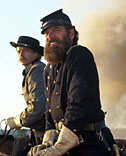
Movie Guru Rating:

Comment
on this review
| |

In Gods and Generals, a religious fanatic leads a war against Yankees
by Jesse Fox Mayshark
I can't decide if the bizarre Civil War epic Gods and Generals is the worst movie of the year or the best. It is either a stupendously dull liberal apologia for the Confederacy or a sly and subversive allegory about the rise of Osama bin Laden. And given the timing of its release, it might just have to be both.
The film is getting favorable buzz in some quarters of the conservative think-tank universe, but it was produced by Ted Turner, who is generally reviled in those same quarters as a mushy liberal one-worlder. This is the guy who gave a billion dollars to the U.N. Yet here he is making a war movie, and not only that but maybe the only war movie you could possibly make right now in which the Yankees are the bad guys—a movie in which the dynamic, heavily bearded leader of a band of fighters rallies them to protect their homeland against "Yankee commercial interests." (All the Southern officers have alarming facial hair, great blowsy gusts of beards. The Yankees mostly stick to handlebars and sideburns.)
The movie is a staggering three hours and 45 minutes (including a 12-minute intermission), which even by Hollywood's bloated post-Titanic standards is close to unconscionable. The central figure is none other than Gen. Thomas "Stonewall" Jackson (Stephen Lang), a stern soldier and every inch a man of God. He always has a Bible close to hand. When he's getting ready to report for service, he draws his wife into the bedroom—to pray with him. Lang, whose beard makes him look like he's eating a woodchuck, plays Jackson as if he were already bronzed. He is fiercely serene, particularly in battle (the legendary incident that gave him his nickname is duly enacted), a dewy-eyed stoic who inspires looks of worshipful adoration from his subordinates.
The presentation is disconcerting; clearly we are meant to admire Jackson for his conviction and nobility. (He even loves small children—complacent after battles, he breaks down sobbing when a little girl dies of scarlet fever.) But it's hard not to notice that his conviction and nobility lead him to fairly obscene actions. His vision of God includes no concept of human mercy. When one of his officers informs him that the men have named their cannons Matthew, Mark, Luke and John, he nods approvingly. Before one battle, Jackson surveys the field in a fit of religious ecstasy and exults, "Lord, if it is your will for us to fight here today, thy will be done!" His exhortations inevitably recall a certain other bearded religious fanatic who has recently petitioned for divine assistance in casting out the Yankee invaders.
The movie doesn't have a plot so much as a timeline. It marches—literally—through about two and a half years of the war, with lots of scenes of generals huddled over maps, talking about where the men should go and how bloody the battles will be, followed by scenes of the men (helpfully labeled by precise company name in ways that will delight Civil War re-enactors and mean nothing to anyone else) walking idiotically into round after round of rifle fire, retreating, and then walking back into the fire again. This is presented not as a clearly insane exercise but as some grand, tragic romance set to soaring strings and thunderous kettle drums. There is an effort at balance between the Union and Confederate perspectives, with Jeff Daniels as the best of all possible Yankees, a philosophy professor turned infantry officer who lectures his brother on not using the word "darkies." But this is primarily a Southern story—they're going to love it at the heavily featured Virginia Military Institute, especially since it has the discretion to end in 1863 with the Confederacy ascendant.
Much of the endless dialogue is designed to assure us that, yes, slavery was terrible (although the word doesn't get a mention until after an hour's worth of chest-thumping about sovereignty and states' rights), but that even an independent South would have ended it in short order. The movie also gives Jackson a faithful black cook, Ol' Jim, who gently lectures the general on the evils of human bondage. Jackson listens with rapt sympathy. Turner, triangulating as nimbly as his pal Bill Clinton, has accomplished something Trent Lott can only envy—an anti-slavery endorsement of the Confederacy.
It is, in other words, a no-fault war movie, with bravery and honor for everyone—and bravery and honor themselves become the film's objects of desire, net virtues regardless of the goal they are put toward. If there's one thing about which all the generals on all sides agree, it is that there is nothing nobler in human experience than the disciplined, principled slaughter of other humans.
As the title tells you, Gods and Generals is not much concerned with the bulk of the people who actually make up its Southern and Northern armies. They are abstractions at best (Jackson is obsessively fond of "his" men), and cannon fodder at worst. What counts is what the generals say and do—good or bad, glorious or stupid. And the film makes clear that there is little these men would rather do than wage war.
This is either a movie made by people who love generals, or it's a movie made by people who think generals are the most dangerous people on earth. If nothing else, it might tell you which one of those you are.

February 27, 2003 * Vol. 13, No. 9
© 2000 Metro Pulse
|